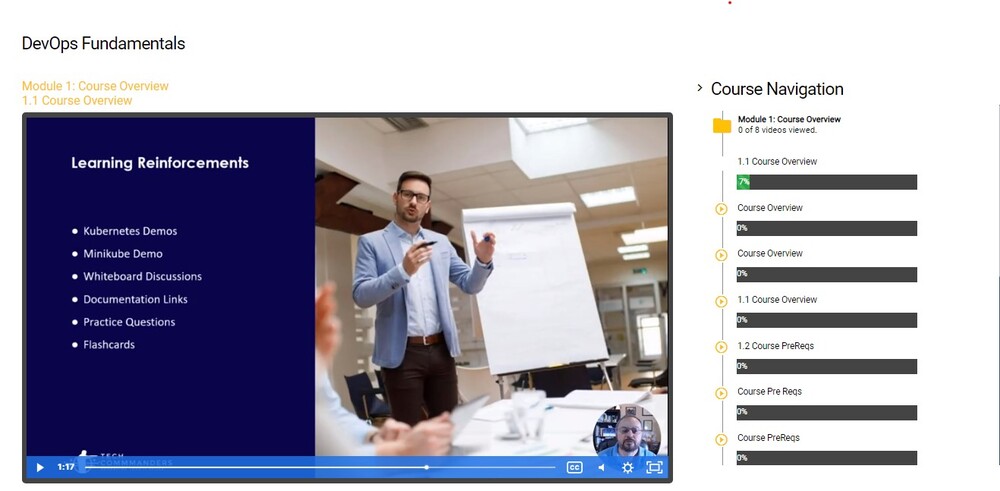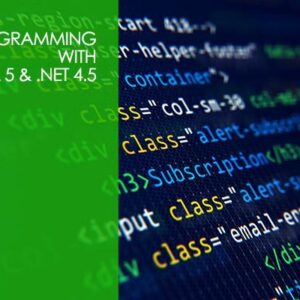Course Description:
Get ready to supercharge your IT career with our Intro to DevOps IT training course! If you’re seeking to level up your skills and become an expert in one of the hottest job functions in the industry, this course is tailor-made for you. Say goodbye to the traditional silos between development and operations, and embrace the transformative power of DevOps!
Led by the seasoned industry veteran, Joe Holbrook, this course is designed to equip beginners with the essential knowledge and practical expertise to thrive in the DevOps IT field. With Joe’s decades of experience, you’ll gain unparalleled insights into the core principles of DevOps and learn how to implement them effectively within your organization.
But that’s not all! We know that real-world application is key to mastering any skill. That’s why our course goes beyond theory and immerses you in a hands-on learning experience. Through engaging demos and interactive whiteboard sessions, you’ll witness DevOps principles come to life before your eyes. No more dull lectures or mindless slides—this course is dynamic, exciting, and designed to keep you engaged from start to finish.
As you progress through the course, you’ll have access to a progress tracker, enabling you to monitor your advancement and celebrate your achievements along the way. And to truly test your understanding, we’ve included a comprehensive practice quiz. It’s not just about passive learning; we want you to actively apply your knowledge and identify any areas that need further reinforcement.
Now, let’s talk about the amazing benefits you’ll reap by mastering DevOps. By embracing this cutting-edge approach, you’ll gain the ability to streamline software development and deployment processes, resulting in faster and more reliable releases. Say goodbye to tedious manual tasks and hello to automation and efficiency! DevOps also fosters collaboration, empowering teams to work together seamlessly and break down those pesky silos that hinder progress.
Are you ready to revolutionize your career? This course is perfect for programmers looking to deploy applications on the industry-leading Google Cloud Platform (GCP). Cloud managers, administrators, architects, and developers will also find immense value in this course, as it equips you with the skills demanded by the ever-evolving IT landscape.
Don’t miss out on this incredible opportunity to become a DevOps champion. Enroll now and unleash your potential! Plus, upon successful completion of the course, you’ll receive an industry-recognized certification, validating your newfound expertise and opening doors to exciting career prospects. Let’s embark on this DevOps journey together and pave the way to success!
Who should take this course?
- Administrators
- Engineers
- Network administrators
- DevOps engineers
- Product Managers
- Operations Managers
- System Administrators
- Business Managers
- Developers interested in the practical application of DevOps principles in production environments
DevOps Fundamentals – What you will learn & what comes with the course:
- Explore the advantages of a DevOps strategy and see how it can benefit software development, deployment, and operations in an integrated way.
- Basic Introduction to the different tools, technologies, and terminologies that make up the continuous integration landscape so you can get a better understanding of how it works.
- Over 30 lectures/modules on the topic of DevOps training
- Gain knowledge of Continuous Integration, Deployment, and Release Management, and equip yourself with the skills to make it work for you.
- Infrastructure as Code, and Key Performance Indicators (or KPIs).
- Supplemental links for study reference material
- Uncover the commitments that operations engineers have to undertake in order to keep a system functional, with as little disruption or downtime as possible.
- Instructor contact info for any questions after the course is complete
Course Outline:
Module 1: Course Overview
Course Overview
Course Pre Reqs
Module 2: The Basics
The Basics
What is DevOps
DevOps Building Blocks
DevOps Best Practices
Why Containers
What is a Pipeline
Continuous Integration and Continous Delivery
Continuous Deployment
Pipelines – Whiteboard
Module 3: Development
Development Basics
CICD Strategy
Source Control Management
Demo – Build Management
Module 4: Infrastructure
Release and Deployments
Release Management
Demo – Release Management
Reliability Engineering
DevOps Tools
Infrastructure as Code
Automation
Demo – (IaaC) CloudFormation
Demo – Jenkins
Demo – GitHub
Module 5: Key Performance Indicators (KPIs)
Key Performance Indicators (KPI)
KPI Metrics
KPI Tools
Monitoring Applications
Demo – AWS CloudWatch
Module 6: Course Closeout
Course Closeout
6.1 Module 6 Introduction
Summary Review
6.2 Course Review
Additional Resources
6.3 Blockchain Roles
DevOps Job Outlook
Course Closeout




